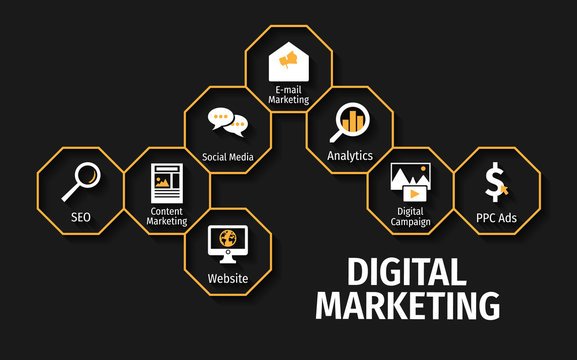In today’s digital age, having a strong online presence is essential for any business looking to thrive. Whether you’re running a small local shop or a large e-commerce platform, chances are your customers are finding you through search engines like Google. This is where Search Engine Optimization (SEO) comes into play. SEO is the practice of optimizing your website so that it ranks higher in search engine results, making it easier for potential customers to find you.
But SEO is not just about using the right keywords or getting a few backlinks. It’s a comprehensive strategy that combines technical adjustments, content creation, user experience improvements, and more. In this post, we’ll break down the key components of SEO, explain how it works, and show you why it’s crucial for the success of your business.
What is SEO?
SEO, or Search Engine Optimization, is the process of optimizing a website to improve its visibility in search engine results pages (SERPs). When someone searches for something on Google (or any other search engine), algorithms determine which websites show up at the top of the results. The higher your website ranks, the more likely people are to click on it.
SEO aims to improve your ranking by aligning your website’s content, structure, and performance with the factors that search engines use to determine rankings. SEO is divided into two main categories:
- On-Page SEO: This refers to optimizing elements directly on your website, such as content, meta tags, images, and URL structures.
- Off-Page SEO: This focuses on factors outside of your website, such as backlinks (links from other websites), social signals, and online reviews, which contribute to your site’s credibility and authority.
Key Elements of SEO
To understand how SEO can help your business, let’s break down its key components:
1. Keyword Research
Keywords are the terms and phrases that users type into search engines when looking for information, products, or services. Effective keyword research helps you understand what your target audience is searching for and allows you to create content that meets their needs.
- How It Works: SEO tools like Google Keyword Planner, SEMrush, or Ahrefs can help you find relevant keywords with good search volume and low competition. Once you identify these keywords, you can strategically include them in your website’s content, meta tags, and headlines to improve your ranking.
- Example: If you run a bakery in London, you’ll want to target keywords like “best bakery in London” or “buy cakes online in London.”
2. On-Page SEO
On-page SEO involves optimizing elements within your website to improve search engine rankings. This includes everything from your site’s content and meta descriptions to its URL structure and internal linking.
- Content Quality: Search engines prioritize websites with high-quality, relevant content. Make sure your website’s content is informative, engaging, and tailored to your audience’s needs. Avoid keyword stuffing and aim for a natural flow of language.
- Meta Tags: Meta titles and descriptions should include relevant keywords and provide a concise summary of each page’s content. These are often the first things users see in search results, so they need to be compelling.
- Internal Linking: Linking to other pages within your own website helps search engines understand the structure of your site and can keep users engaged longer by guiding them to more relevant information.
3. Off-Page SEO
Off-page SEO focuses on building your website’s authority and trust through external factors, such as backlinks from reputable websites. The more high-quality websites that link to your content, the more credible your website will appear to search engines.
- Backlink Building: Backlinks are one of the most powerful ranking factors. When authoritative websites link to your content, it signals to search engines that your site is trustworthy and relevant. Reach out to blogs, influencers, and industry leaders to build relationships and secure backlinks.
- Social Signals: While not a direct ranking factor, having a strong presence on social media can drive traffic to your website and increase brand visibility. Share your content across platforms like Facebook, Instagram, and LinkedIn to attract more visitors.
4. Technical SEO
Technical SEO involves optimizing the backend of your website so that search engines can crawl and index it effectively. It also ensures that your site runs smoothly and offers a positive user experience.
- Website Speed: Slow-loading websites frustrate users and are penalized by search engines. Tools like Google PageSpeed Insights can help you analyze your website’s load times and identify areas for improvement.
- Mobile Optimization: With the majority of internet traffic now coming from mobile devices, Google has adopted mobile-first indexing, which means it prioritizes the mobile version of your site when determining rankings. Make sure your website is responsive and offers a seamless experience on all devices.
- Site Structure and Navigation: A clear, logical site structure helps search engines understand your content and makes it easier for users to navigate. Use straightforward URLs, headers, and menus to improve your website’s organization.
5. User Experience (UX)
Search engines prioritize websites that provide a positive user experience. This includes fast load times, mobile-friendliness, intuitive navigation, and relevant content. The goal is to keep visitors engaged and encourage them to spend more time on your site.
- Bounce Rate: A high bounce rate—when users leave your site after viewing only one page—can negatively impact your rankings. To reduce bounce rate, make sure your content is relevant to the user’s search intent and that your website is easy to navigate.
- Dwell Time: This refers to how long a visitor stays on your page before leaving. The longer users stay, the more valuable search engines perceive your content to be, which can improve your rankings.
Why SEO is Crucial for Your Business
Now that we’ve covered the core elements of SEO, you may be wondering: Why should I invest time and resources into SEO for my business? Here are some of the biggest benefits:
1. Increased Visibility
The higher your website ranks in search engine results, the more likely people are to find it. With proper SEO, your business can appear on the first page of Google for relevant keywords, increasing your chances of attracting potential customers.
2. Organic Traffic
Unlike paid ads, SEO attracts organic traffic, which means visitors come to your website naturally rather than through advertisements. While SEO requires an investment of time and effort upfront, it pays off in the long run with steady, consistent traffic that doesn’t rely on an advertising budget.
3. Builds Trust and Credibility
When your website appears at the top of search results, it’s seen as more credible and trustworthy by users. People tend to trust Google’s top-ranked sites, so improving your SEO can boost your brand’s authority and reputation.
4. Better User Experience
A significant aspect of SEO is improving your website’s usability, which leads to a better user experience. When users can easily navigate your site, find the information they need, and enjoy a seamless experience, they’re more likely to stay longer and convert into customers.
5. Competitive Advantage
Your competitors are likely investing in SEO, which means you could be missing out on potential customers if you’re not doing the same. By staying on top of SEO best practices, you can maintain a competitive edge in your industry and attract more customers.
Conclusion
In today’s digital world, SEO is no longer optional—it’s essential for businesses that want to thrive online. By optimizing your website for search engines, you’ll not only attract more traffic but also build trust, credibility, and long-term success. Whether you’re focusing on keyword research, technical SEO, or building high-quality backlinks, every effort you put into SEO will help elevate your business.
For small businesses in competitive markets, cheap SEO London is a cost-effective way to improve your online visibility and stand out from the competition. With the right strategies and a focus on quality, you can achieve high search engine rankings without breaking the bank.



